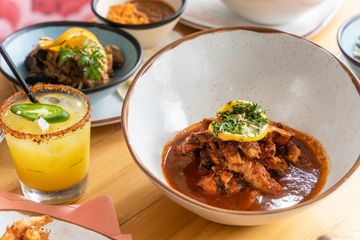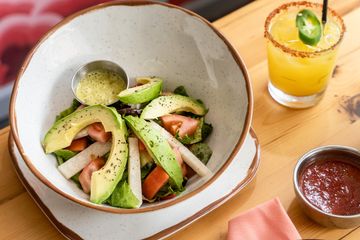Discover why everyone loves tacos served fresh
Wiki Article
Is Mexican Food Healthy And Balanced? Unloading the Nutritional Perks of Conventional Active Ingredients
The concern of whether Mexican food is healthy and balanced welcomes an exploration of its traditional components. Beans and corn act as foundational staples, rich in protein and fiber. Avocados provide valuable fats, while different herbs and seasonings add flavor and wellness benefits - hand crafted margarita. With each other, these parts produce a tapestry of nourishment. The healthiness of Mexican cuisine usually depends on preparation techniques and part dimensions. What duty do these aspects play in establishing its total nutritional worth?The Power of Beans: Healthy Protein and Fiber-Rich Staples
Usually overlooked, beans serve as a keystone of Mexican cuisine, supplying a wide range of nutritional benefits. Rich in protein, they are a superb plant-based option for those looking for to meet their dietary protein requires. This high healthy protein material sustains muscle repair work and development, making beans important for both meat-eaters and vegetarians alike. Furthermore, beans are an outstanding source of dietary fiber, which aids in food digestion and advertises a sensation of volume, potentially aiding with weight monitoring.The variety of beans used in Mexican recipes, such as black beans, pinto beans, and kidney beans, adds to a diverse taste account and can boost meals nutritionally. Furthermore, beans are reduced in fat and consist of necessary minerals and vitamins, including iron, magnesium, and folate. Together, these qualities make beans an essential ingredient, delivering both nourishment and nourishment in conventional Mexican fare.

Corn: a Versatile Grain With Nutritional Advantages
Corn attracts attention as a flexible grain essential to Mexican cuisine, commemorated not only for its cooking applications but likewise for its excellent dietary profile. As a primary ingredient in dishes like tortillas, tamales, and pozole, corn offers necessary nutrients that add to a well balanced diet. Rich in carbohydrates, it offers as a substantial power source, while also being reduced in fat, making it a beneficial alternative for different dietary demands.Corn is an excellent resource of dietary fiber, which aids in digestion and promotes satiation. It contains significant quantities of vitamins such as B-complex vitamins, which are necessary for power metabolic rate. The presence of antioxidants, particularly carotenoids, adds to overall health and wellness by reducing oxidative anxiety. Furthermore, corn is gluten-free, satisfying those with gluten sensitivities. In general, the dietary benefits of corn highlight its relevance in conventional Mexican food and its function in a healthy diet.
Avocados: Healthy Fats and Nutrients in Every Bite
Avocados play a substantial duty in Mexican food, matching recipes with their creamy appearance and rich flavor. Beyond their cooking allure, avocados are celebrated for their outstanding nutritional profile. They are an abundant source of healthy and balanced monounsaturated fats, which can aid reduced bad cholesterol levels and support heart health. Additionally, avocados are loaded with important nutrients, including potassium, vitamin E, and B vitamins, adding to general health.The high fiber web content in avocados aids food digestion and advertises satiety, making them a useful addition to any type of dish. Their unique nutrient composition can also support skin health and wellness and give anti-inflammatory advantages. Integrating avocados into typical Mexican recipes or appreciating them as a standalone treat can boost both taste and nourishment, demonstrating why they are a precious staple in Mexican cuisine. On the whole, avocados provide a delicious means to appreciate healthy fats and critical nutrients in every bite.

Natural Herbs and flavors: Flavorful Health And Wellness Boosters
While taking pleasure in the rich flavors of Mexican cuisine, one can not forget the important duty that spices and herbs play in improving both preference and health. Ingredients such as oregano, cilantro, and chili peppers not only add to the vivid taste account however likewise offer significant health and wellness benefits. Cilantro is known for its purifying buildings, helping to eliminate hefty metals from the body, while oregano is loaded with antioxidants and possesses anti-inflammatory effects.Chili peppers, a staple in lots of Mexican dishes, contain freshly made guacamole capsaicin, which has actually been linked to improved metabolism and discomfort relief. Additionally, seasonings like cumin and coriander assistance digestion and may help in blood glucose regulation. Integrating these delicious wellness boosters right into meals not only boosts the culinary experience however also advertises general health, making Mexican food not just tasty, but additionally nutritionally helpful.
Conventional Food Preparation Techniques: Enhancing Nutrition and Taste
Traditional food preparation methods in Mexican food play an essential role in improving both nutrition and flavor, as they often focus on fresh ingredients and classic strategies. Techniques such as nixtamalization, where corn is soaked and cooked in an alkaline remedy, not only boost the nutrient profile of tortillas however likewise boost their digestibility - tacos. In addition, using slow-moving cooking techniques, like cooking or braising, allows flavors to meld perfectly while retaining the stability of the active ingredientsRegularly Asked Concerns
Are Mexican Food Portions Typically Larger Than Various Other Cuisines?
Mexican food sections are frequently bigger than those of many other foods. This characteristic shows typical dining methods, emphasizing common sharing and hearty dishes, which can bring about a more considerable offering dimension in general.
Exactly how Does the Preparation Method Affect Healthiness of Mexican Food?
Prep work methods considerably affect the healthiness of Mexican food. Methods such as cooking or steaming preserve nutrients, while frying can enhance undesirable fat web content. Choices of components and cooking styles ultimately identify general dietary worth.Can Mexican Food Be Tailored for Certain Nutritional Constraints?
Mexican food can indeed be tailored for specific dietary restrictions. Alternatives, such as utilizing corn tortillas for gluten-free diet regimens or including even more veggies, make it possible for people to enjoy conventional flavors while fitting different nutritional requirements.What Are Usual Misconceptions About Mexican Food and Health And Wellness?
Typical misconceptions regarding Mexican food consist of the belief that it is inherently undesirable, overly zesty, and only concentrated on fats. In truth, typical recipes usually include healthy ingredients and can be tailored to numerous dietary needs.Are There Healthier Options at Mexican Restaurants?
Much healthier alternatives at Mexican dining establishments usually consist of barbequed meats, beans, and fresh veggies. Choosing dishes that stress entire components and avoiding hefty sauces can cause a much more nutritious eating experience, promoting total well-being.The range of beans utilized in Mexican recipes, such as black beans, pinto beans, and kidney beans, contributes to a diverse taste profile and can boost dishes nutritionally. Avocados play a considerable role in Mexican food, matching meals with their creamy appearance and abundant flavor. Including avocados into traditional Mexican recipes or enjoying them as a standalone treat can enhance both flavor and nutrition, showing why they are a beloved staple in Mexican food. While delighting in the abundant flavors of Mexican food, one can not overlook the necessary role that spices and natural herbs play in enhancing both preference and health. Standard food preparation methods in Mexican food play an essential function in boosting both nutrition and taste, as they typically focus on fresh ingredients and classic strategies.
Report this wiki page